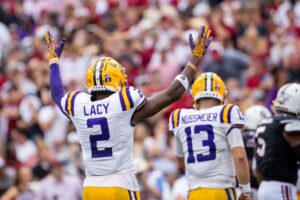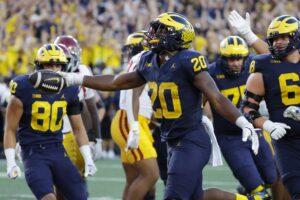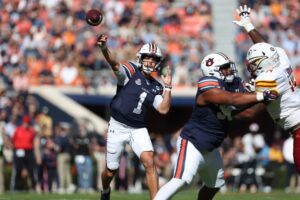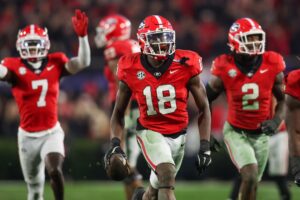The Iowa Hawkeyes turn the page to November hoping to put the end of last month behind them. In the final month of the regular season, Iowa has a chance to finish the year strong and potentially earn 10-wins. This Saturday, the Hawkeyes travel to Evanston to face the defending Big Ten West champions in Northwestern. The Wildcats are having a down year sitting at 3-5 this season, but Pat Fitzgerald’s team always plays Iowa very well. Northwestern has won four of the last five against the Hawkeyes, and nine of 15 since Fitzgerald took over. Last year’s early-season loss to the Wildcats ended up being the deciding factor for the West. While the implications aren’t as heightened this season, Iowa’s opportunity against Northwestern is the first step towards keeping their divisional hopes alive.
Coaching Consistency
Kirk Ferentz and Fitzgerald are two of the longest-tenured head coaches in college football. Ferentz is coaching his 23rd season at Iowa, and Fitzgerald is in his 16th at Northwestern. The two have been models of consistency for Big Ten football, and have built momentous cultures in their respective facilities. Ferentz and Fitzgerald have become the faces of their programs. When you think of Iowa or Northwestern football, you think of these two leaders. In their 39 combined years, the two have just nine total losing seasons, five under Fitzgerald and four under Ferentz.
Fitzgerald has won 109 games at Northwestern including 64 Big Ten games, both of which are school records. In recent years, he has had the Wildcats on a successful streak. They have been to five bowl games in the last six years with a 4-1 record. The most notable of which came last season in the Citrus Bowl with a win over Auburn. Fitzgerald has led Northwestern to three 10-win seasons and averages just over seven wins per year. His biggest victory came in 2009 against the fourth-ranked Hawkeyes in Iowa City to deflate Iowa’s national title hopes. Ferentz, on the other hand, has coached six double-digit winning seasons and can make it a seventh this year if Iowa runs the table. After winning the Big Ten West in two of the last three seasons, Northwestern has lost some production and is currently in a rebuilding phase.
A Rebuilding Defense
Unlike past seasons, the Wildcats will not have the dominant defense that Fitzgerald is accustomed to building. Northwestern has the 93rd overall defense in the FBS according to Pro Football Focus. They give up over six yards per play and have been allowing 27 points per game. Last season, the Wildcats had two top-50 rated defensive backs and a first-round offensive lineman. Now, they have no defensive players inside the top 200 and the offense is in the bottom third of the FBS. There are clearly some deficiencies within this Northwestern team, and some could play into Iowa’s hands.
The key weakness for the Iowa offense this season has been the offensive line. As a unit, they are the second-worst in pass protection in the Big Ten in front of only Nebraska. In the last two games, Iowa has played arguably two of the best defensive fronts in the conference. Both Purdue and Wisconsin are inside the top 25 in terms of pass rush efficiency. The Boilermakers recorded four sacks and six quarterback hurries against Iowa. Wisconsin tallied six sacks and 10 tackles for loss last week. Both defensive fronts were better than the Hawkeye line and it showed in both games. Northwestern’s pass rush, however, ranks 94th in the country. The Wildcats currently average less than two sacks per game. This unit will be a step back from what Iowa has faced in previous weeks. With additional time in the pocket, Spencer Petras should have the ability to make decisions and move the ball down the field with greater efficiency.
[pickup_prop id=”10806″]
Wildcats to Watch
While the rush defense is not rated highly on a national level, the Wildcats have one guy who can create pressure. Adetomiwa Adebawore is Northwestern’s sack and tackles for loss leader with 3.5 and seven on the year, respectively. The defensive end has had productive numbers all season and posted a career-high seven tackles against Rutgers a few weeks ago. For Iowa to have any success offensively against the pass rush, they will need to contain Adebawore. In the Hawkeyes’ last two games, they struggled to contain George Karlaftis of Purdue and Nick Herbig of Wisconsin. Both of them are top 15 edge pass rushers Their pressure was detrimental to Iowa’s offensive pulse. Adebawore is not quite at their level, but still poses a threat to a weaker offensive line.
The other player to look for on Saturday is running back Evan Hull. After losing Cam Porter for the season with an injury, Hull has stepped in as the go-to back in Evanston. This season, he is averaging 6.5 yards per attempt and has scored five touchdowns. With the uncertainty at the quarterback position for Northwestern this season, the running game has been an area where they can rely on production. Iowa’s defensive front has been solid this year, and they continue to contain the run giving up only 2.9 yards per attempt. They showed their strength on Saturday against Wisconsin, making an impressive goal-line stand. Iowa has a lot of force upfront and could make things difficult for Hull.
Iowa’s Opportunity Against Northwestern
Iowa’s offense will look to find its footing this weekend against Northwestern’s defensive front. Petras has allowed 69 total quarterback pressures this season, which is third-worst in the conference. Interestingly, according to Pro Football Focus, only 7.2% of those pressures were quarterback-induced. That 7.2% is the third-best in the conference. The remaining percentage of pressures have been allowed by either the offensive line or a defensive advantage like a blitz. Iowa’s opportunity against Northwestern this weekend is a great chance to find some consistency in pass protection. Petras’ adjusted completion percentage still sits at 70% on the season, and he’ll have opportunities on Saturday to move the ball. In the 16th meeting between Ferentz and Fitzgerald, Iowa will look to get back on track and make a push for the Big Ten West.






